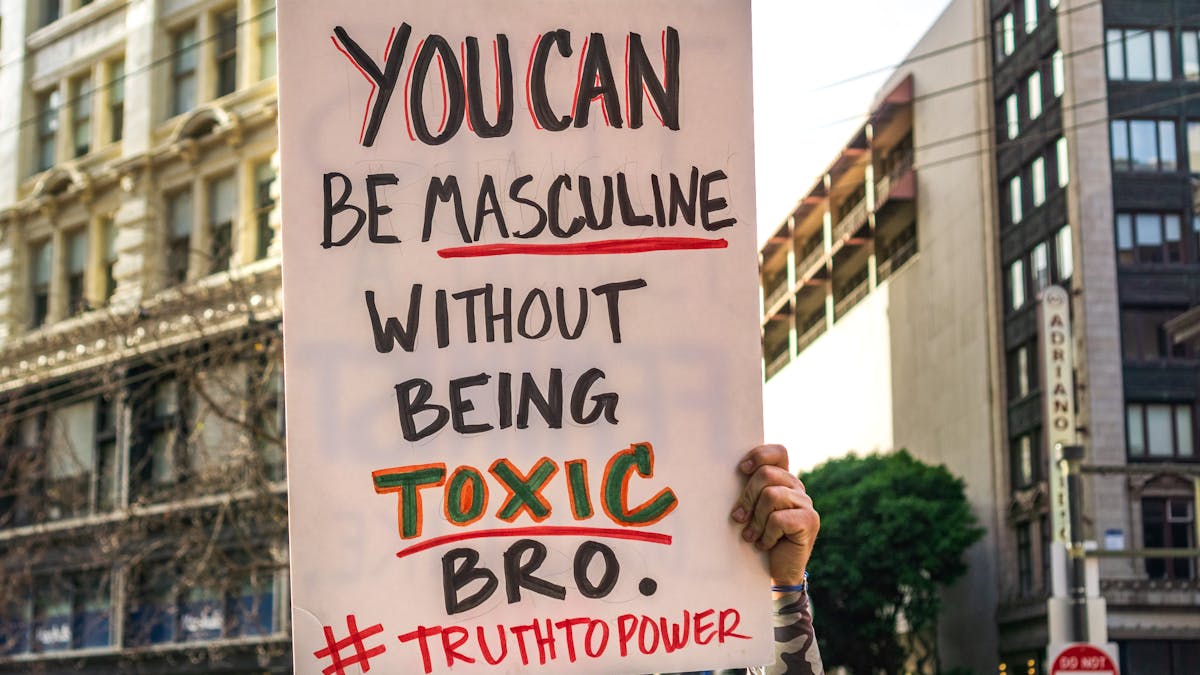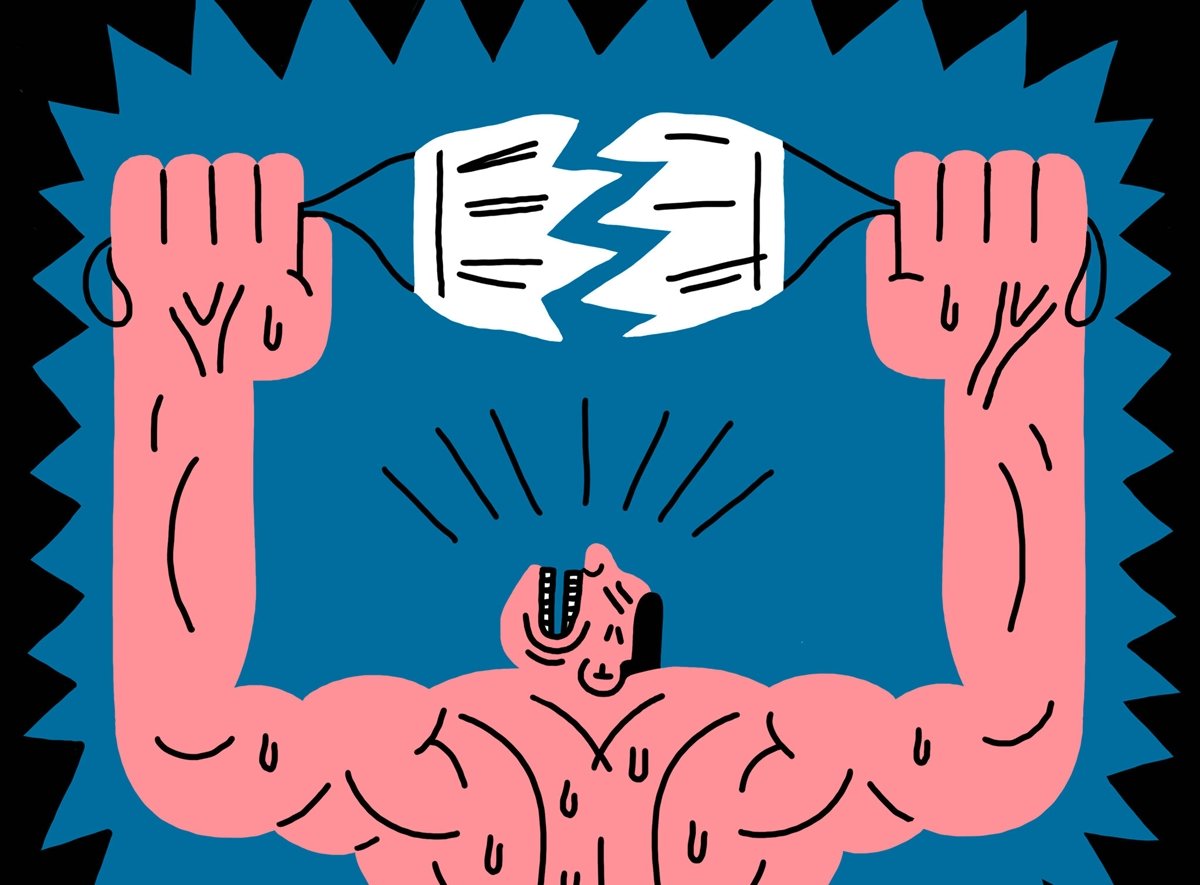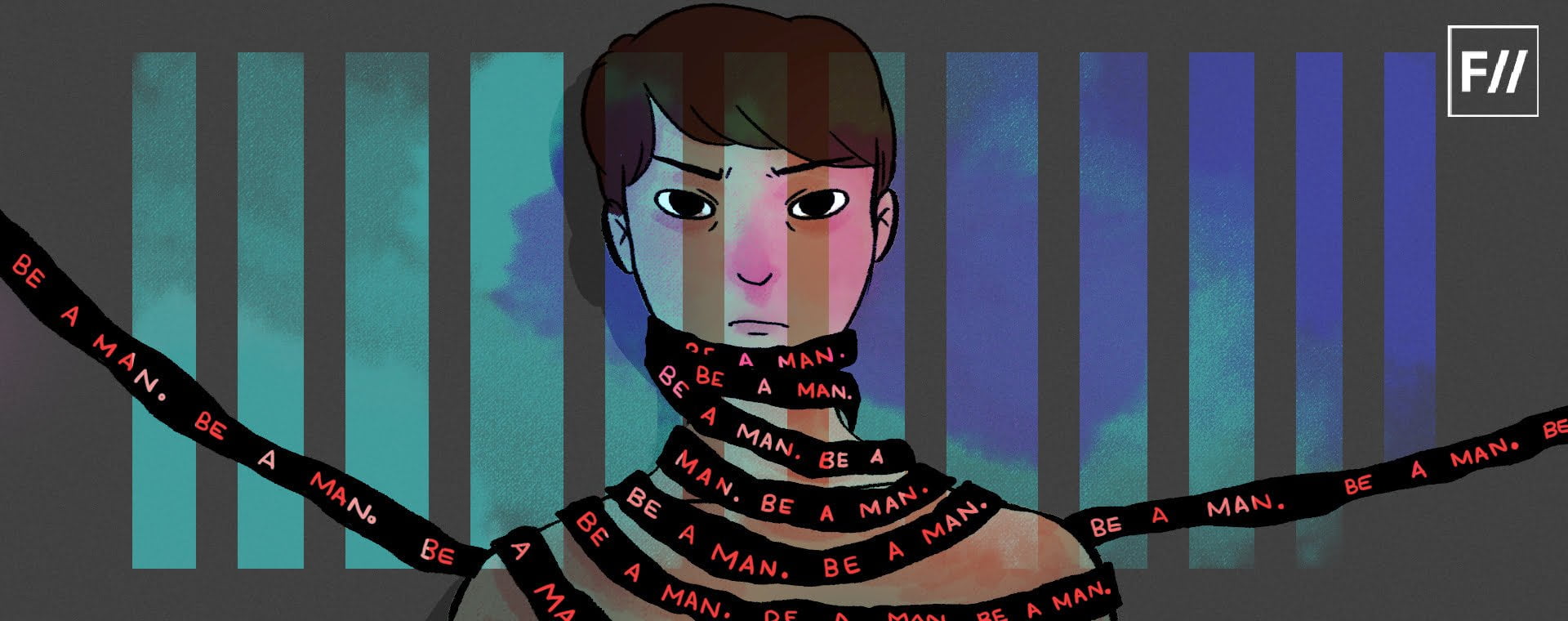Editor’s Note: FII’s #MoodOfTheMonth for October, 2021 is Navigating Complex Emotions. We invite submissions on coping with complicated feelings, throughout this month. If you’d like to contribute, kindly email your articles to sukanya@feminisminindia.com
Anand Patwardhan’s documentary, Father, Son and Holy War was filmed after the communal riots following the destruction of Babri Masjid in 1992. This film explores masculinity in two parts: 1) performing masculinity; 2) construction of masculinity. The film stays very relevant even today, though it was made in the 90s. It is also interesting to note that its screening was banned by the Congress government.
In the film, having burned down shops of the minority community, one young man says apne ko to maza aya. Others shout pridefully: hum mard ki aulad hain. Little boys watch WWE wrestling matches on TV and aspire to become Indian Rambos. Young men say it’ll be fun to rape a woman after watching rape-films. Educated, childless couples attend a Santanogopal mantra camp to conceive a “high quality progeny”, preferably male. A Hindu leader claims Hindustan is for Hindus. Sikhs want Khalistan. A Muslim religious leader says a woman’s place is inside the home, and considers equality unnatural. Salman Rushdie should be killed for insulting Islam by writing Satanic Verses, another says.
Anand Patwardhan’s documentary, Father, Son and Holy War was filmed after the communal riots following the destruction of Babri Masjid in 1992. This film explores masculinity in two parts: 1) performing masculinity; 2) construction of masculinity. The film stays very relevant even today, though it was made in the 90s. It is also interesting to note that its screening was banned by the Congress government.
I haven’t watched a documentary that deconstructs the collective insanity of the khichri, slow-cooked by patriarchy, that of sexism, masculinity, nationalism, religion, and communal violence as poignantly and objectively as Father Son and Holy War does. Scene after scene highlights the illogical narrative of violence you’d not want to believe exists. But it does.
Also read: Haseen Dillruba: Bollywood’s Ongoing Love Affair With Violence & Misogyny
The Mask You Live In (2015) by The Representation Project is a must-watch documentary for all boys and men in your life. This film depicts how boys become men. To be a cis-het man means to devalue everything feminine, such as emotional expression, empathy, intimate friendships. Masculinity is drilled into boys by society, religion, politics, and all-too-pervasive digital media. There’s much to grieve over, but the film’s message is positive in its tenet that traditional masculinity is a socially-constructed mask. The journey to authenticity starts with encouraging boys and men to understand that wearing this mask is perilous, and by encouraging them to come out of the “man box.” Some startling stats that the film highlights are:
- 93% boys are exposed to internet porn;
- Average boy consumes 40 hrs/week of TV, sports, movies and 2 hours per week of internet porn
- 31% men are addicted to video games.
- The most violent video games are the most addictive.
- Average 18-yr-old boys have seen 200,000 acts of violence on screen.
- 90% murders are committed by men.
Why are we then shocked that boys with so much exposure to violence fail to grow up to be sensitive and caring men?
Promising Young Woman (2020) directed by Emerald Fennell is a feminist thriller that most certainly passes the Bechdel test. The hideous masculinity of self-professed nice men is exposed as men who think it’s okay to have sex with a drunk woman without her consent; men who stand around, watching a classmate getting raped, film the rape, and circulate the video. The Bro Code prevents good men (and women) from spilling the truth about fellow colleagues. Why do they feel compelled to support the status quo: doctors, surgeons, lawyers, academic deans—the very people you are likely to think of as trustworthy pillars? It’s also a film about female friendships, how patriarchy hollows out two intelligent, promising young women’s careers and life.
Also read: Boyish: Attempting To Break Rigid Hetero-Masculinities, One Essay At A Time
As we dissect these films, it becomes quite clear that:
Toxic masculinity is a global scourge: It harms men just as much, if not more, than women. Men are also the victims of other men’s violence. Its manifestation varies with culture and country, but the underlying performance mantra is the same: men must act tough and masculine, and especially around women and other weaker people. To prove you’re a man, you’ve got to prove you’re not a woman. i.e. eradicate all signs of femininity.
Toxic masculinity is an act, a mask, a performance: Or how else can the act of men raping, battering, harassing, abusing women and children without shame or remorse be normalised?
Toxic masculinity benefits the patriarchal state: Or how can it be okay that the likelihood of getting punished by law for heinous crimes against women is so low?
Digital technology legitimises toxic masculinity: Internet pornography, misogynist portrayals of women in video games, advertising, movies, posters, memes consumed by boys at ever younger ages demean and objectify women’s body parts. Porn-educated men can’t see women as whole persons.
Not all men are like this. I hear you. But such men do exist in large numbers. They are not statistical outliers. If you’ve never come across such men, that in fact makes you a statistical outlier. The violent men in Father, Son and Holy War and the good men in Promising Young Woman were behaving quite normally and intentionally displaying extreme aggression, appearing tough, unemotional, insensitive, and treating sex with any woman as a commodity they are entitled to, threatening with, and/or using violence against women and members of marginalised communities.
So, is healthy masculinity a possibility?
Yes, according to Andrew Reiner, author of Better Boys, Better Men: The New Masculinity That Creates Greater Courage and Emotional Resiliency, a “re-imagined masculinity is the way forward.” The only way forward, I think. For a start, fathers can model and practice emotional honesty, says Andrew. Not many fathers hug their sons publicly. Hugging your son is a such a teeny-weeny step forward, easy enough to do, don’t you think? What need, then to constantly hammer into your sons to toughen up? Toughness. Is that the only way to be a man? He won’t be less of a man if he shows vulnerabilities, cries when he needs to, expresses feeling and asks for help when he needs help. And you’re there to hold him when he does.
Jor-El Caraballo, therapist, writer and mental health advocate for LGBTQ+ community, says healthy masculinity makes men:
- Accept their bodies even if they’re not perfectly muscular and sculpted.
- Treat women and girls with the same thoughtfulness with which they like to be treated.
- Use their privilege as men to advocate for women and others.
- Create and maintain friendships.
- Develop as emotionally available caretakers and parents to both boys and girls.
- Accept that anger is no excuse for violence or abuse.
- Experience and enjoy touch and affection with other men.
- Create instead of destroy.
Most importantly, adopting a healthy masculinity means not using your size, strength, or power to get what you want from others.
Emotional honesty carries the promise of making men emotionally healthier. Emotionally healthy men can express a complex range of emotions such as sadness, grief, shame, kindness, tenderness. They can espouse feminine values of care, empathy, and develop better listening skills. Men’s range of emotional expression can extend beyond just anger, lust, jealousy and happiness. It’s never too late for men to (re)educate themselves about what it means to be a healthy man. It’s meaningless and one-dimensional to “act” macho.

“True leadership today,” predicts Umair Haque, “and for the next century, is about nurturing and elevating and expanding the possibilities of things— with care, gentleness, defiance, courage, truth, rebellion, grace. Sure, men can do that, too. But patriarchy and capitalism and supremacy — the great systems of male violence that have run our world for millennia now — can’t…..The future will be made of values like inviolability, nurturance, and dignity. It will be made of care, gentleness, truth, possibility. It will be about giving and affirming and cultivating life — not taking it and owning it exploiting it.”
We cannot continue to live on this planet unless men develop better social skills, give up emotionally arid communication styles, and drop their planet-destroying values of greed, domination, cut-throat competition, and violence. The future has to be one which is feminine but at the same time, not gender binary codified and one that does not assign roles and values to people based on their gender.
We cannot continue to live on this planet unless men develop better social skills, give up emotionally arid communication styles, and drop their planet-destroying values of greed, domination, cut-throat competition, and violence. The future has to be one which is feminine and at the same time, not gender binary codified and one which does not assign roles and values to people based on their gender.
Self-reflect on the perils of masculinity, men! Low social and emotional intelligence masculinity is a grave risk to your health and long-term survival.
Nighat Gandhi is a psychotherapist and writer who identifies as queer Sufi-feminist. Her latest short story collection is WAITING (ZUBAAN BOOKS, 2019). She’s also a regular contributor at Muse India and InPlainspeak.
Featured image source: New York Times




